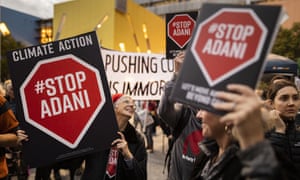Exclusive: taxpayers risk subsidising ‘a foreign-owned unregulated monopoly asset’, the Australia Institute says
Queensland
taxpayers risk subsidising “a foreign-owned unregulated monopoly asset”
if the state government signs a royalties agreement with Adani before
securing access to the company’s rail line, the Australia Institute
says.
The state government has set a self-imposed deadline of 30 September to finalise the terms of a royalty deferment with Adani. Both parties say negotiations over royalties are ongoing and confidential.
Under a “transparent policy framework” adopted by the state in 2017, Adani must provide multi-user infrastructure to be eligible to defer royalty payments.
Guardian Australia has confirmed the Queensland Competition Authority, which regulates third-party use of private infrastructure, has not yet been asked to consider access arrangements.
In a new report, the Australia Institute argues a royalty deal should
not be signed until after the QCA has assessed the rail line. It
estimates a royalties deferment could be worth $250m to $700m to Adani.The state government has set a self-imposed deadline of 30 September to finalise the terms of a royalty deferment with Adani. Both parties say negotiations over royalties are ongoing and confidential.
Under a “transparent policy framework” adopted by the state in 2017, Adani must provide multi-user infrastructure to be eligible to defer royalty payments.
Guardian Australia has confirmed the Queensland Competition Authority, which regulates third-party use of private infrastructure, has not yet been asked to consider access arrangements.
In 2017 Queensland announced the new framework to offer favourable royalties packages – allowing payments to be deferred, with interest – to mining companies which were the first to build infrastructure in undeveloped areas. The secretive policy was considered a political masterstroke by the Labor government – allowing it to do a deal that would benefit Adani, while claiming it had kept an election promise not to give the company taxpayer subsidies or special treatment.
In a statement released at the time, the government said projects approved for the royalties incentive must abide by certain principles, including the provision of “third-party access infrastructure”.
The state has been in negotiations with Adani about the details for more than two years, since the parties reached an in-principle agreement.
Changes to the scale of the Carmichael project in the meantime have raised questions about whether Adani will still be eligible for a royalties deal under those principles.
When the framework was announced, the Carmichael project was planned to include infrastructure considered critical to the development of the Galilee Basin – an airport, a rail line to the Abbot Point port and a second terminal at the port. Each has since been scrapped or shelved.
Instead Adani will build a rail spur line linking the Carmichael mine to the Aurizon freight network. There are already concerns the rail plan leaves little to no additional capacity on the network.
The Australia Institute’s research director, Roderick Campbell, said the competition authority needed to work with Adani on access agreements “like in all Queensland’s rail lines and other significant infrastructure.
“Otherwise, there is no guarantee that Adani’s rail can be used by other parties and is therefore not eligible for the royalty deferment,” Campbell said. “Adani shouldn’t be treated differently to the rest of the coal rail network.
“This is a worthy investment of time to ensure Queensland taxpayers are not left short-changed subsidising a rail line that would ultimately be a foreign-owned, unregulated monopoly asset.
“Subsidising coal mines as the world tackles climate change is bad enough. Subsidising coal mines and unregulated monopoly assets would be plain stupid.”
Negotiations between the Queensland government and Adani broke down last year, but resumed after the May federal election and after a shellshocked Labor pivoted in support of the coal industry.
Guardian Australia understands the previous sticking point had been the government’s insistence – and another requirement of the state policy – that Adani provide security for any deferred payments. It is unclear whether that has been resolved.
The Queensland deputy premier and treasurer, Jackie Trad, said negotiations were ongoing and “parties are working in good faith to meet the coordinator general’s timeframe”.
Trad said another project, New Century Zinc, had already secured government approval for a royalty deal under the framework.
“The (framework) principles seek to ensure that major new resource projects deliver secure local jobs at no cost to the taxpayer and all monies owed to the Queensland people through the use of our resources is paid in full,” Trad said.
“Adani have advised that the commencement of construction of the Carmichael mine is not dependent on the finalisation of … negotiations.”
Adani said in a statement: “We are continuing to work with the Queensland government to finalise the royalties agreement.
“The details of the royalties agreement are commercial in confidence.”

No comments:
Post a Comment